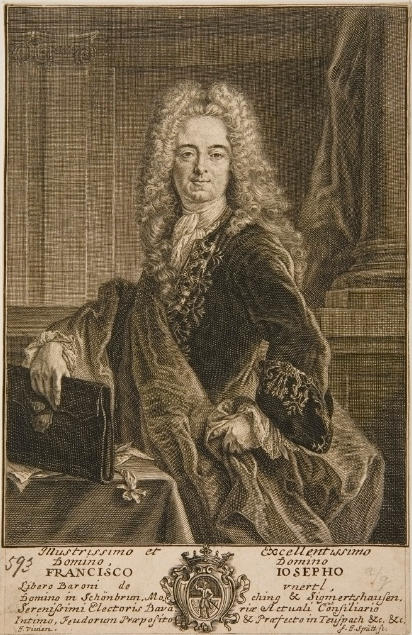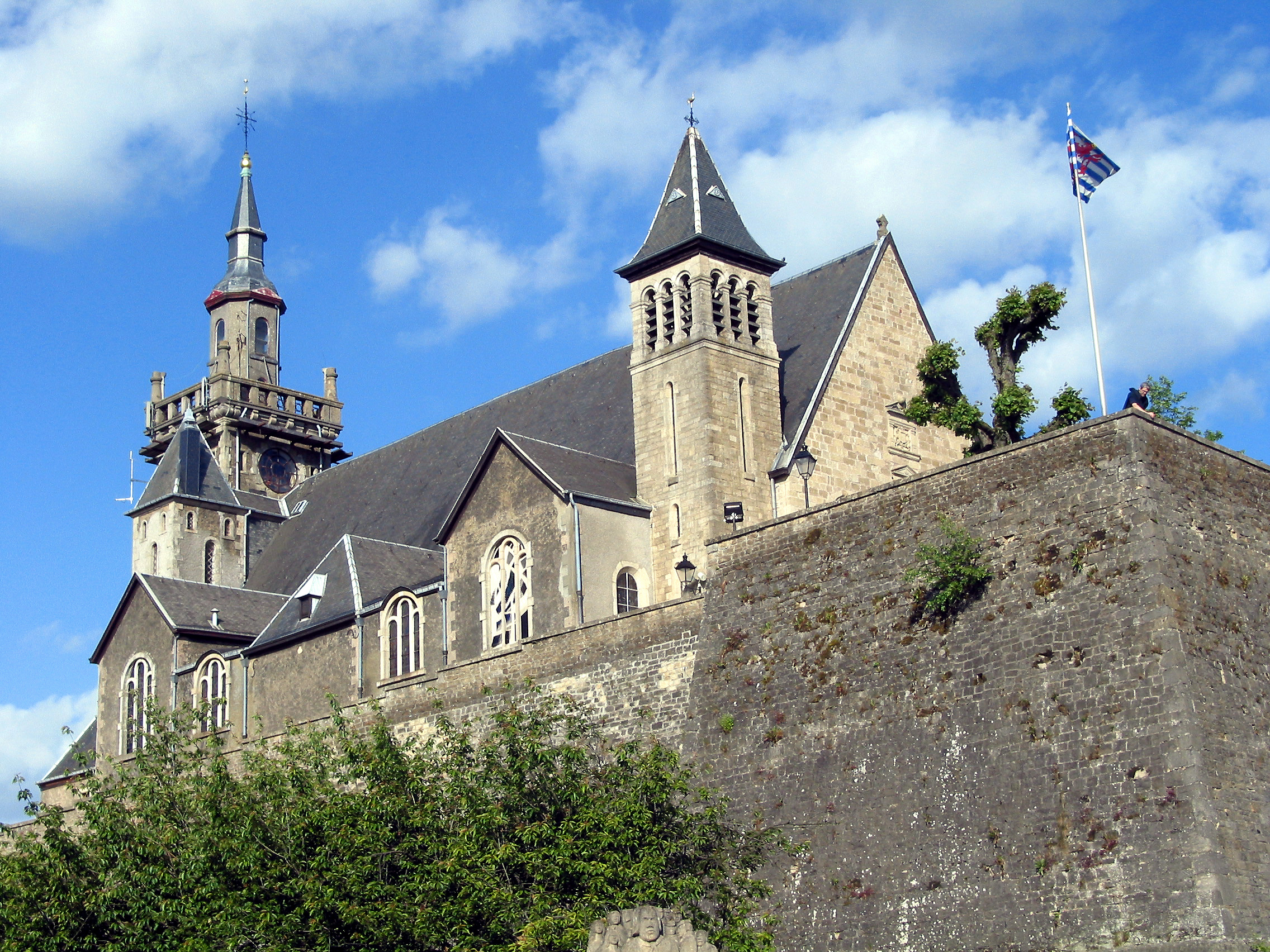|
Johann Kaspar Basselet Von La Rosée
Johann Kaspar (Jean-Gaspard) Reichsgraf Basselet von La Rosée (30 April 1710 - 12 April 1795) was a leading Bavarian general. Basselet von La Rosée was born at Arlon, Province of Luxembourg, Belgium. Advancing his career in the army of his new fatherland Bavaria, his positions included electoral Privy Councillor, Lieutenant Field Marshal and Director of the War Council. In 1761, he was appointed an honorary member of the Bavarian Academy of Sciences and Humanities, in 1764 created an Imperial Count (title recognized in Bavaria in 1766). In approximately 1760, he purchased the villages of Feldafing and Possenhofen as well as Rose Island, thus becoming the owner of the longest connected waterfront of Lake Starnberg. In 1834, his heirs sold the whole property to Duke Maximilian in Bayern, while King Ludwig I became proprietor of the island. In 1770, Count Basselet von La Rosée purchased the estate of Mauern near Moosburg. He died, aged 84, in Munich Munich ( ; ger ... [...More Info...] [...Related Items...] OR: [Wikipedia] [Google] [Baidu] |
Bavaria
Bavaria ( ; ), officially the Free State of Bavaria (german: Freistaat Bayern, link=no ), is a state in the south-east of Germany. With an area of , Bavaria is the largest German state by land area, comprising roughly a fifth of the total land area of Germany. With over 13 million inhabitants, it is second in population only to North Rhine-Westphalia, but due to its large size its population density is below the German average. Bavaria's main cities are Munich (its capital and largest city and also the third largest city in Germany), Nuremberg, and Augsburg. The history of Bavaria includes its earliest settlement by Iron Age Celtic tribes, followed by the conquests of the Roman Empire in the 1st century BC, when the territory was incorporated into the provinces of Raetia and Noricum. It became the Duchy of Bavaria (a stem duchy) in the 6th century AD following the collapse of the Western Roman Empire. It was later incorporated into the Holy Roman Empire, be ... [...More Info...] [...Related Items...] OR: [Wikipedia] [Google] [Baidu] |
Moosburg
Moosburg an der Isar (Central Bavarian: ''Mooschbuag on da Isa'') is a town in the ''Landkreis'' Freising of Bavaria, Germany. The oldest town between Regensburg and Italy, it lies on the river Isar at an altitude of 421 m (1381 ft). It has 18,033 inhabitants (2016) and covers an area of 44 km2. It is easily reached by the A 92 autobahn and regional trains on the Munich–Regensburg line. Furthermore, it takes just 20 minutes to get to Munich Airport. Moosburg is popular with commuters who travel to Munich, Freising, and Munich Airport. There is considerable industry in the town consisting of chemical, electro-technical, food processing, and machine-building plants. History There was a Benedictine abbey in Moosburg in the 8th century: a cluster of dwellings and artisans sprang up around it. Duke Heinrich der Löwe started the construction of the Kastulus Minster (cathedral) in 1171, dedicated to Saint Castulus – whose supposed relics were brought to the c ... [...More Info...] [...Related Items...] OR: [Wikipedia] [Google] [Baidu] |
People From Arlon
A person ( : people) is a being that has certain capacities or attributes such as reason, morality, consciousness or self-consciousness, and being a part of a culturally established form of social relations such as kinship, ownership of property, or legal responsibility. The defining features of personhood and, consequently, what makes a person count as a person, differ widely among cultures and contexts. In addition to the question of personhood, of what makes a being count as a person to begin with, there are further questions about personal identity and self: both about what makes any particular person that particular person instead of another, and about what makes a person at one time the same person as they were or will be at another time despite any intervening changes. The plural form "people" is often used to refer to an entire nation or ethnic group (as in "a people"), and this was the original meaning of the word; it subsequently acquired its use as a plural form of pe ... [...More Info...] [...Related Items...] OR: [Wikipedia] [Google] [Baidu] |
1795 Deaths
Events January–June * January – Central England records its coldest ever month, in the CET records dating back to 1659. * January 14 – The University of North Carolina opens to students at Chapel Hill, becoming the first state university in the United States. * January 16 – War of the First Coalition: Flanders campaign: The French occupy Utrecht, Netherlands. * January 18 – Batavian Revolution in Amsterdam: William V, Prince of Orange, Stadtholder of the Dutch Republic (Republic of the Seven United Netherlands), flees the country. * January 19 – The Batavian Republic is proclaimed in Amsterdam, ending the Dutch Republic (Republic of the Seven United Netherlands). * January 20 – French troops enter Amsterdam. * January 23 – Flanders campaign: Capture of the Dutch fleet at Den Helder: The Dutch fleet, frozen in Zuiderzee, is captured by the French 8th Hussars. * February 7 – The Eleventh Amendment to the United St ... [...More Info...] [...Related Items...] OR: [Wikipedia] [Google] [Baidu] |
1710 Births
Year 171 ( CLXXI) was a common year starting on Monday (link will display the full calendar) of the Julian calendar. At the time, it was known as the Year of the Consulship of Severus and Herennianus (or, less frequently, year 924 ''Ab urbe condita''). The denomination 171 for this year has been used since the early medieval period, when the Anno Domini calendar era became the prevalent method in Europe for naming years. Events By place Roman Empire * Emperor Marcus Aurelius forms a new military command, the ''praetentura Italiae et Alpium''. Aquileia is relieved, and the Marcomanni are evicted from Roman territory. * Marcus Aurelius signs a peace treaty with the Quadi and the Sarmatian Iazyges. The Germanic tribes of the Hasdingi (Vandals) and the Lacringi become Roman allies. * Armenia and Mesopotamia become protectorates of the Roman Empire. * The Costoboci cross the Danube (Dacia) and ravage Thrace in the Balkan Peninsula. They reach Eleusis, near Athens, and de ... [...More Info...] [...Related Items...] OR: [Wikipedia] [Google] [Baidu] |
Aloys Basselet Von La Rosée
Johann Kaspar Aloys Reichsgraf Basselet von La Rosée (5 May 1747 Munich - 5 December 1826) was a Bavarian official and judge as well as a member of the Illuminati. He was a son of Lieutenant Field Marshal Johann Kaspar Basselet von La Rosée and grandson of the Bavarian State Chancellor Franz Xaver Josef von Unertl. Aloys was a jurist and became electoral Bavarian chamberlain and court councilor. Later he was appointed president of the High Court of Appellation in Munich. In 1772, he became an honorary member of the Bavarian Academy of Sciences and Humanities. He owned the villages of Feldafing including Rose Island, Possenhofen and Pöcking near Lake Starnberg Lake Starnberg, or ''Starnberger See'' ) — called Lake Würm, or ''Würmsee'' , until 1962 — is Germany's second-largest body of fresh water, having great depth, and fifth-largest lake by area. It and its surroundings lie in three different Ba .... References * Neue Deutsche Biographie vol. 8, p. 158 {{DE ... [...More Info...] [...Related Items...] OR: [Wikipedia] [Google] [Baidu] |
Franz Xaver Josef Von Unertl
Franz Xaver Josef Baron von Unertl (21 February 1675 – 22 January 1750) was a Bavarian politician. Unertl was born in Munich. He served as Electoral Bavarian Privy Council Chancellor and Conference Minister. His role under the Austrian occupation during the Spanish Succession War The War of the Spanish Succession was a European great power conflict that took place from 1701 to 1714. The death of childless Charles II of Spain in November 1700 led to a struggle for control of the Spanish Empire between his heirs, Phil ... remains dubious. He died in his home town of Munich. His sister Maria Johanna was married to the important salt merchant Johann Baptista Ruffini. External links Short Biography of von Unertl in the Allgemeine Deutsche Biographie {{Germany-politician-stub 1675 births 1750 deaths Politicians from Munich Barons of Germany People from the Duchy of Bavaria Geheimrat Political office-holders in Bavaria ... [...More Info...] [...Related Items...] OR: [Wikipedia] [Google] [Baidu] |
Johann Baptista Ruffini
Johann Baptista Ruffini (1672 – 16 June 1749) was an important salt trader in Bavaria. He was born in Meran. He married Maria Johann Unertl (1689–1768), a sister of the Privy Council Chancellor and Conference Minister Franz Xaver Josef Freiherr von Unertl and niece of the Traunstein salt administrative officer Johann Zacharias von Mezger, Edler von Meggenhoven. His son-in-law was Lieutenant Field Marshal, War Council Director, and Privy Councillor Jean-Gaspard Reichsgraf Basselet von La Rosée. His grandson was the President of the Electoral Bavarian Upper Court of Appellation, Aloys Reichsgraf Basselet von La Rosée. Ruffini was elevated Electoral Bavarian Court Chamber Councillor and Imperial Privy Councillor. In 1720, he was ennobled in Vienna. He is remembered through the Ruffini House at Munich's Rindermarkt, named after the Ruffini tower which he bought in 1708. He died in Munich, and his tombstone is at the outer wall of St. Peter's Church in Munich. The pres ... [...More Info...] [...Related Items...] OR: [Wikipedia] [Google] [Baidu] |
Haag An Der Amper
Haag an der Amper is a municipality in the district of Freising in Bavaria in Germany Germany,, officially the Federal Republic of Germany, is a country in Central Europe. It is the second most populous country in Europe after Russia, and the most populous member state of the European Union. Germany is situated betwee .... References Freising (district) {{Freising-geo-stub ... [...More Info...] [...Related Items...] OR: [Wikipedia] [Google] [Baidu] |
Munich
Munich ( ; german: München ; bar, Minga ) is the capital and most populous city of the German state of Bavaria. With a population of 1,558,395 inhabitants as of 31 July 2020, it is the third-largest city in Germany, after Berlin and Hamburg, and thus the largest which does not constitute its own state, as well as the 11th-largest city in the European Union. The city's metropolitan region is home to 6 million people. Straddling the banks of the River Isar (a tributary of the Danube) north of the Bavarian Alps, Munich is the seat of the Bavarian administrative region of Upper Bavaria, while being the most densely populated municipality in Germany (4,500 people per km2). Munich is the second-largest city in the Bavarian dialect area, after the Austrian capital of Vienna. The city was first mentioned in 1158. Catholic Munich strongly resisted the Reformation and was a political point of divergence during the resulting Thirty Years' War, but remained physically unt ... [...More Info...] [...Related Items...] OR: [Wikipedia] [Google] [Baidu] |
Arlon
Arlon (; lb, Arel ; nl, Aarlen ; german: Arel ; wa, Årlon; la, Orolaunum) is a city and municipality of Wallonia located in and capital of the province of Luxembourg in the Ardennes, Belgium. With a population of just over 28,000, it is the smallest provincial capital in Belgium. Arlon is also the capital of its cultural region: the Arelerland (Land of Arlon in Luxemburgish). The municipality consists of the following districts: Arlon, Autelbas, Barnich, Bonnert, Guirsch, Heinsch, and Toernich. Other population centers include: * Autelhaut * Clairefontaine * Fouches * Frassem * Freylange * Hachy * Heckbous * Rosenberg * Sampont * Schoppach * Sesselich * Seymerich * Stehnen * Sterpenich * Stockem * Udange * Viville * Waltzing * Weyler * Wolberg History Roman and medieval times Before the Roman conquests of Gaul, the territory of Arlon and a vast area to the southeast were settled by the Treveri, a Celtic tribe. The local population adapted relatively easil ... [...More Info...] [...Related Items...] OR: [Wikipedia] [Google] [Baidu] |

_1938.jpg)


